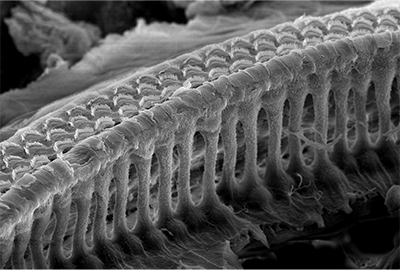On Tuesday, May 28, 2019, Thomas B. Friedman, Ph.D., will discuss how deafness can be inherited (passed down through generations). Genetic research can improve our understanding of which gene variants are associated with human hereditary deafness. By identifying these gene variants, scientists may be able to diagnose certain forms of hereditary hearing loss earlier and more accurately. Dr. Friedman is the chief of the Section on Human Genetics at the National Institute on Deafness and Other Communication Disorders (NIDCD), part of the National Institutes of Health (NIH).
This seminar is part of a series of presentations by NIDCD researchers called Beyond the Lab, Understanding Communication Disorders. Designed for administrative and support staff as well as scientists, the Beyond the Lab speaker series gives NIDCD staff, the larger NIH community, and the public the opportunity to learn about the NIDCD’s research advances in deafness and other communication disorders, conditions that significantly affect about 20 percent of U.S. adults over the course of their lives.

- What: “Human hereditary deafness is complex yet easy to grasp,” part of the NIDCD Beyond the Lab, Understanding Communication Disorders speaker series
- Who: Tom Friedman, Ph.D., chief of the Section on Human Genetics at the NIDCD
- When: Tuesday, May 28, 2019, 12:00 p.m.- 1:00 p.m.
- Where: Building 40, Rooms 1201-1203, NIH campus, Bethesda, Maryland. You can also view the presentation online.
Hearing loss is central to the mission of the NIDCD. Researchers have identified dozens of genetic factors associated with hearing loss. Genetic factors are responsible for about 50 to 60 percent of hearing loss cases in children, and can influence the likelihood that aging or environmental factors such as loud noise will lead to hearing loss.
Using real-life examples from his lab, Dr. Friedman will share the scientific journey of identifying a gene variant that causes deafness. By identifying families across the world whose members are particularly likely to be affected by hearing loss, the Friedman lab explores genes that relate to hearing loss. They also use animal models to research the mechanisms of this hearing loss.
Individuals who need sign language interpreting and/or other reasonable accommodations to participate in this event should contact Lonnie Lisle at 301-827-8183.
About the Speaker

Dr. Friedman earned a B.S. and Ph.D. from the University of Michigan, where he worked with Tahir Mohammed Rizki on the molecular genetics of purine metabolism in Drosophila. After postdoctoral work studying galactosemia in humans at the National Institute of Mental Health, he became a faculty member in the Department of Zoology and the Department of Pediatrics and Human Development at Michigan State University. For five years, he was also the director of the Interdepartmental Graduate Program in Genetics. In 1996, he joined the NIDCD as the chief, Laboratory of Molecular Genetics. Dr. Friedman's Section on Human Genetics studies hereditary hearing loss in humans and animal models. His laboratory also studies the functions (cell biology and biochemistry) of proteins encoded by genes associated with deafness.

